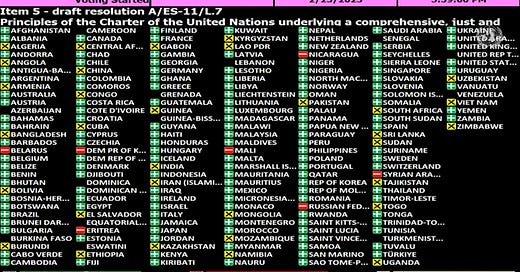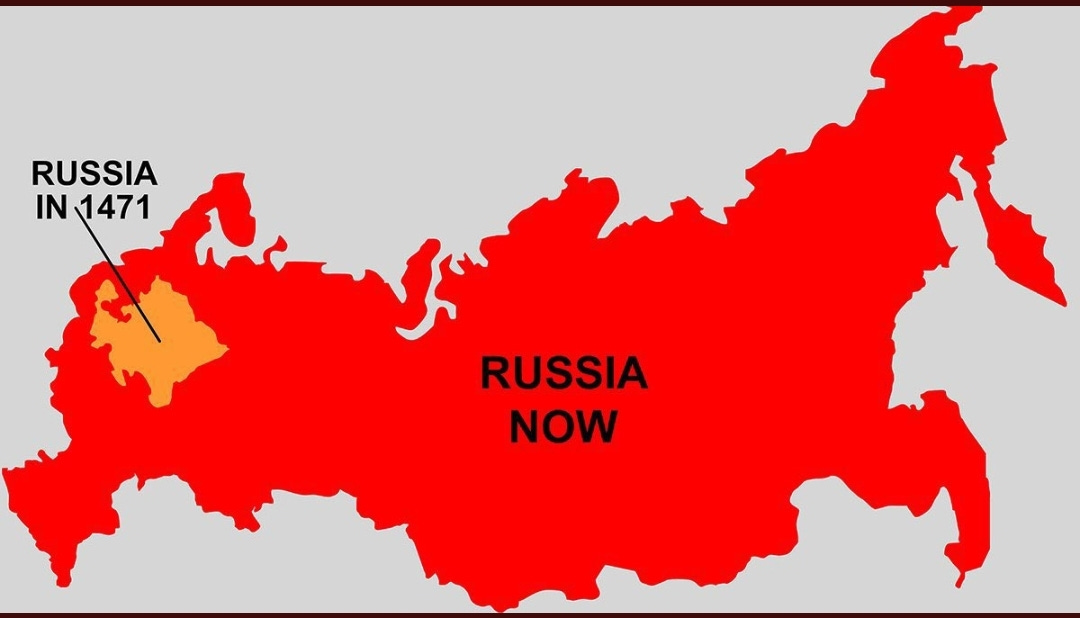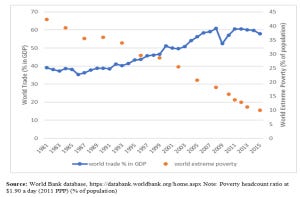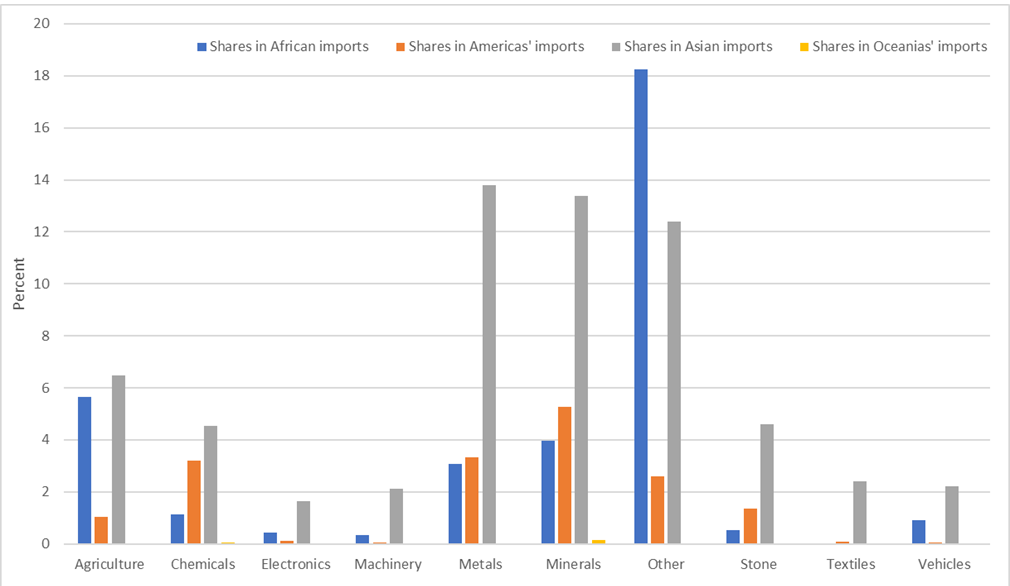Why the Global South should side with Ukraine
In fact, most countries and people in the Global South are against muscovy's war to re-colonise Ukraine.
Spoiler: The Global South should support Ukraine because people in their own countries support Ukraine. The Global South should support Ukraine because muscovy is a imperialistic regime waging a genocidal war against Ukraine. The Global South should support Ukraine because muscovy's weaponising of food has made people in the Global South poorer. The Global South should support Ukraine, since apart from grain, muscovy is irrelevant. In fact, most people and governments in the Global South support Ukraine.
But, regimes in the Global South that need help to murder, rape, and torture people, support muscovy. They do it because they find muscovy’s centuries of experience in genocide, useful.
The Global South is a list of countries with different views, not a coalition of countries with a common agenda.
The term, Global South, was coined sometime in the 1960s at the UN to describe countries and regions that were generally poorer and less developed than those in the Global North. It is a broad term that encompasses a wide range of countries, from sub-Saharan Africa to Latin America to South Asia. This UN report from 2004 lists the countries included in the Global South. All African and Asian countries, except for Israel, Hong Kong, Japan, Macao, Singapore, South Korea, and Taiwan but with Cyprus and Turkey, the Caribbean and Latin America, and Pacific Islands.
Many of the countries in the Global South share experiences of being colonies of countries in Western Europe. Because of their common colonial past, many of these countries began to co-operate in loosely formed alliances such as Group of 77, and the Non-Aligned Movement though I am not sure how active these alliances are now. In any case, the perception or characterisation of Global South has changed from a focus on development or cultural differences towards an emphasis on geopolitical power relations. In that sense, the Global South has become to be presented in media as sharing common views when it comes to foreign policy including relations with countries in the Global North. That is a simplified presentation of governments in the Globa South.
While most countries in the Global North condemned muscovy’s invasion of Ukraine and imposed sanctions, countries in the Global South have been hesitant to follow suit when it comes to sanctions. While a large majority of Global South countries have supported UN General Assembly Votes against the muscovy invasion, the vocal responses of the same governments show more variation compared to governments in the Global North.
Some policy makers in the Global South have not only been hesitant to critisize muscovy but also critical of the Global North. The latter have been accused of having double standards, ignoring their own colonial pasts, and imposing sanctions that have worsened the food crisis in the Global South. This issue of Foreign Affairs provide an overview of the reluctance of some governments in the Global South to support Ukraine.
But that article and similar are not representative of what people and governments in Global South think. The thing with Foreign Affairs’ article and most media writing about the Global South, is that they tend to emphasize controversial statements that receive a lot of attention and views on their web sites. But, when you dig deeper in what people in the countries and its citizens think, you’ll find that most of them support Ukraine even though the governments haven’t imposed sanctions on muscovy.
The majority of Global South in on Ukraine’s side
The Global South has voted against muscovy in the UN General Assembly,
Source: United Nations, https://news.un.org/en/story/2023/02/1133847
Comments by some political leaders that are more understanding of muscovy also shows up in some ridiculous peace proposals, such as the one from Indonesia, giving away large parts of Ukraine to muscovy. On the other hand, Indonesia supported Ukraine in the UN General Assembly vote. Contradictory actions and statements like these make it difficult to assess what political leaders think about muscovy’s genocidal war.
A more serious initiative is the Brazzaville Foundation delegation from Egypt, Senegal, Congo-Brazzaville, Comoros, Zambia, Uganda which South Africa joined. (As seen above, half of them voted for Ukraine, and half of them abstained). The delegation recently met President Volodymyr Zelensky on 16 June and the little person in the kremlin on 17 June. So far, little is known about this mission. And what has become known is confusing and sometimes contradicting.
Also, parts of what is known is sometimes bizarre, see Paul Canning’s thread on the background, the oddities and reports of this tour. In the meeting with president Zelenskyj, the African leaders emphasized the necessity of terminating the ICC warrant issued for Putin's arrest. But during the meeting with the little person in the kremlin, emphasis had shifted to more pro-Ukrainian proposals according to Tymofyi Mylovanov. But it still early days. I haven’t seen any offical statements by the Brazzaville Foundation.
Some of the political leaders in that delegation, such as the South African, and the Ugandian are reported to be muscovy leaning. They are not representative of what Africans think. And definitely not representative of what people in the Global South think, according to Gallup. Disapproval of muscovy has incrased since its full-scale invasion in the Global South.
Source: Gallup, https://news.gallup.com/poll/474596/russia-suffers-global-rebuke-invasion.aspx
Within the Global South, Latin American populations reacted more negatively to the kremlin’s full-scale invasion. That applies for Brazilians too, whose president Lula has blamed also Ukraine for the war when he claimed that Ukraine and muscovy shared responsibility. In Africa, it appears that more people approve than disapprove of muscovy in Sub-Saharan Africa. This is however the least representative result as many countries in this region are missing in the survey. Nevertheless, South Africa where most people disapprove of mucovy is included. Moving to Asia-Pacific, this is also the case for India.
muscovy is a colonial project
One of the strongest reasons for people in the Global South not to support muscovy’s war is because they recognise a colonisation war when they see one. And muscovy has always been a colonial project. The imperialistic ambitions are inherent characteristics of it, irrespective of whether its ruler is a czar, a communist dictator or the little fascist who is ruling kremlin today. This map, which I have forgotten where I found it, shows the expansion of the muscoyv empire over centuries.
muscovy’s rulers have used the same genocidal tactics during its history. Mass murder, gang rapes, looting, burning or bombing, and mass deportations. Maksym Eristavi has made a great twitter thread about this here. Someone used Maksym’s thread to make this web page Russian colonialism, which briefly documents muscovy colonialism since 1900. For those sceptics thinking that today’s analyses of this subject is just something made up by “russophobes”, here’s a 1969 analysis of muscovy colonialism.
The aim of the colonialism has been to “russify” the occupied countries and territories. As in the colonisation of Ukraine, the genocidal tactis mentioned above have been complemented by tactics aiming at annihilating culture and languages in the occupied areas and enforcing the use of russian in public administration, schools, theatres, music and public spaces elsewhere. Since speaking your own language was disadvantageous, colonised people began to speak russian instead of their own languages.
This is subject of Anisiyo Malachenko’s brilliant thread here. The effects of the colonialism have in many parts of the empire meant that the indigenous populations are minorities, that their languages are extinct or becoming extinct as they are not taught at school. As time goes by, we forget about the people that used to live in the colonised areas of muscovy. That is exactly what muscovy aimed for. As Malachenko writes:
Today, dozens of ethnicities are undergoing the same process. Peoples of subjugated ethnicities are being assimilated over decades and centuries, absorbed into the Russian identity, now identifying as ethnic. Russian themselves. This is how the “Russian” population got so large.
And as Gorodnichenko and Sologoub point out, russian language and culture have long been used as a tool to suppress smaller nations and ethnic minorities, including in the former Soviet republics.
Statues of Alexander Pushkin were erected from Lviv to Bishkek. And, like any empire, Russia also appropriated the achievements of subjugated nations’ talent. Many Western cultural institutions nowadays are reclassifying Ukrainian, Georgian, and other artists long described as “Russian.”
While other countries have repented their colonial past, muscovy has not.
But Russian culture in its current state is purely ornamental, its purpose being to prettify history and sanctify violence (the RussianOrthodox Church even explicitly blessed the war). Unlike English or French culture, Russian culture has failed even to recognize Russian imperialism , let alone reflect upon it. That needs to change if there is ever to be a durable and just peace between Russia and its former colonies.
muscovy in Africa. Murdering, plundering and raping in exchange for gold and votes in the UN.
muscovy not only colonised its neighbours, it colonised Alaska, and even tried to establish a colony on Hawaii. And, muscovy also tried to colonise Africa but failed. After being dismissed by the French on the Red Sea Coast, they turned their attention to Ethiopia, but failed there too.
Today, they’re back in Africa. And they’re there to plunder as this WSJ documentary shows. And murder as in the Aigbado massacre, where at least 65 civilians in the Central African Republic village was killed by Wagner soldiers. The Wagner group has a large presence in the Central African Republic to plunder lucrative gold mines and timber forests. The Wagners not only provide expertise on murder, rape, and looting but have also established a “Russian House” where children are taught to speak russian. Here’s a clip from Swedish Televison about that. And they’re present also in Mali and Sudan where they kill, rape and loot.
The muscovy presence in Sudan is a another example of how muscocy has adapted its colonial tactics since its earlier failures, as reported by the Lansing Institute.
Sudan has lost effective control over its gold deposits. Moscow expands its presence in the country and gets more involved in mining by using corrupt ties with the military junta in Khartoum. Such relations establish colonial relations between Russia and the region. Russia ensures protection of the regime and its worldwide recognition in exchange for getting an access to African resources. The interests of the local population here are thrown under the bus.
The Wagner Group mercenaries appear to have been active in South Darfur since late 2021. The mercenaries are mainly accused of attacks on artisanal gold miners in Um Darfur locality, close to the border with the Central African Republic. In addition, Russia was given some preferences in the mining.
There are tons of evidence that the Wagners have instigated the current crisis in Sudan. A CNN investigation revealed that Wagners transported weapons from muscovy’s bases in Latakia, Libya, and Central Africa well in advance before the fightings began.
A months-long CNN investigation uncovered an increase in Wagner supplies to the RSF that began in the run-up to Sudan’s conflict. Armaments appear to have been shuttled into Sudan through key transit points: Russia’s air and naval base in the Syrian coastal region of Latakia, Wagner bases in Libya, and Bangui airport in the Central African Republic. In return, muscovy was granted large concession in thd old mining industry.
muscovy has weaponised food
Even though food prices have bounced back to pre-war levels, the initial steep increases due to muscovy’s war made people in the Global South, especially in Africa, poorer. In my previous post I qoute The Economist.
Putin makes the world poorer.
Spoiler: Putin’s war against Ukraine has led to decreased supplies of several goods which Ukraine and Russia exports. We have already seen price hikes of oil and gas followed by decreased supply and higher prices of wheat, sunflower oil, fertilizers, steel to mention some of the most important goods. The world will be poorer, and the poorest people wil…
muscovy’s war has lead to decreased supply and higher prices. muscovy has destroyed Ukrainian agricultural fields, closed Ukrainian ports, stolen Ukrainian boats with thousands of tons of wheat from the occupied port of Berdyansk, and destroyed the Nova Kakhovka Dam. And the useless UN is still allowing muscovy to be part of a ludicrous grain deal which effectively decrases the supply of Ukrainain grain. Meanwhile, there are no sanctions on muscoyv grain or fertilizers, see links in my previous post.
putin, and only putin is creating a famine
Spoiler: putin is creating a famine in the countries dependent on grain imports from Ukraine. He’s trying to blame sanctions on russia. That is a lie. There are no sanctions on russian exports of grain, other agricultural products or fertilizers.The food crisis is caused by putin, and only by putin. He blocks Ukrainain ports, he steals Ukrainian grain, …
muscovy doesn’t matter that much
Apart from grain, muscovy is of small economical significance which Ilona Sologoub and I wrote in this op-ed. Severing economic ties with muscovy is therefore less costly that one thinks.
Russia is neither an important supplier nor an important market for most countries (figures 2 and 3). Russian value-added shares of final demand amount to less than one percent in most countries, and for most countries, less than one percent of GDP is created due to Russian final demand. And since the Russian economic footprint is higher in countries that are sanctioning Russia (figure 4), countries that are not yet sanctioning Russia have little to lose by severing their economic ties with Russia.
The figures we provided in our op-ed were based on the OECD Trade in Value Database. It does not cover all countries in the Global South. To get a comprehensive picture, I need to use UN trade data via Harvard University’s project Atlas of Economic Complexity. The advantage with this database is that it covers all countries. The disadvantage is that it reports gross exports/imports and take the existence of global value chains in to account.
To establish the economic importance of muscovy for the Global South, one needs to look at both how important muscovy is as supplier for the Global South and how important markets in muscovy are for the total demand for products from the Global South. As mentioned above, many African countries depend on muscovy for imports of agricultural products. For Central Asian countries at its borders, muscovy is an important supplier of metals and minerals. But for other products, especially knowledge-intensive manufacturing goods, muscovy has nothing to offer. muscovy’s shares in Global South imports of Chemicals, Electronics, Machinery, and Vehicles are around two percent. But maybe there are some advanced torture instruments in the large group Other which contains “commodites not specified according to kind”. This category of products holds a larger share in muscovy exports compared to most other countries.
Imports from muscovy relative to total Global South imports in 2020(%)
Source: The Atlas of Economic Complexity. https://atlas.cid.harvard.edu/
Excluding neighbouring Central Asia, (Kazakhstan, Kyrgyzstan, Tajikistan, Turkmenistan, and Uzebekistan), countries which used to be part of the empire, decreases muscovy’s share in total Asian imports by on average two perenctage units.
Let’s look at the demand side. Even including Central Asia, the share of exports to muscovy in total Asian exports, is only 1.4 percent. And muscovy is even less important for the other parts of the Global South.
Exports to muscovy relative to total Global South exports in 2020(%)
Source: The Atlas of Economic Complexity. https://atlas.cid.harvard.edu/
Conclusions and recommendations.
Conclusions.
Ukraine shares the experiences of colonialism with countries in the Global South. She is being attacked by a country which wants to restore its empire built on colonies.
muscovy is murdering, raping and plundering in countries in Ukraine as well as in countries in the Global South.
muscovy’s war has made the people in the Global South poorer.
The economic ties with muscovy are insignificant for most countries in the Global South.
Recommendation.
Isolote muscovy.









